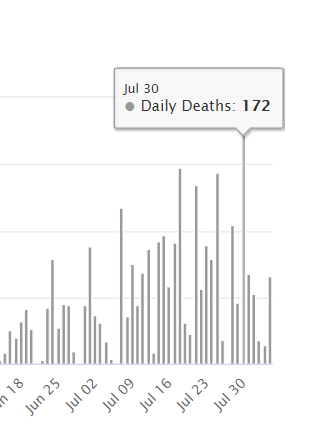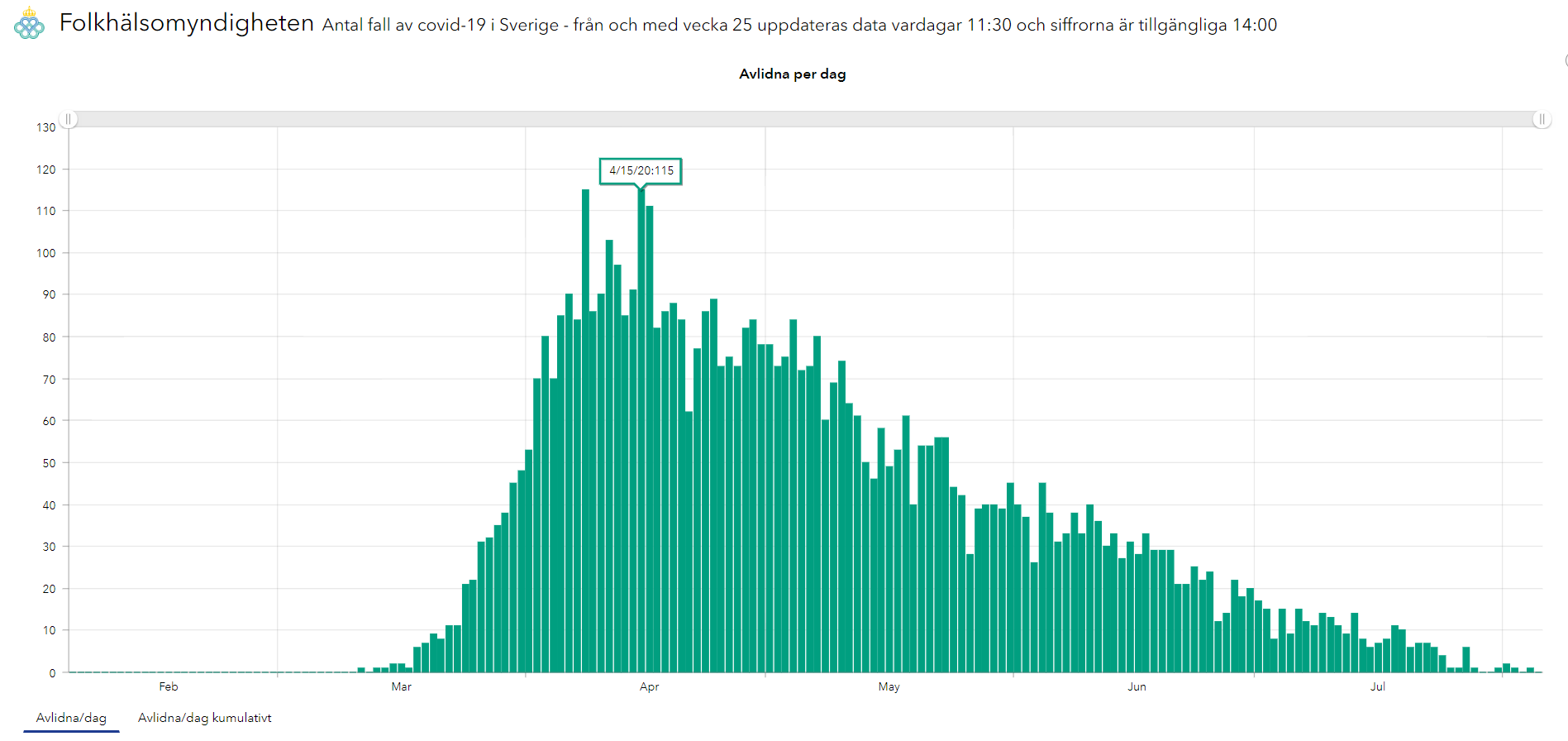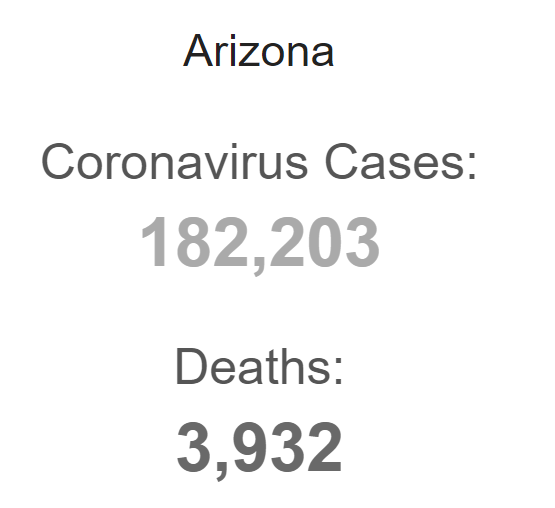Celerity
Celerity's JournalTrump is insane to say that Arizona is a model, at current rates, in a week or sooner, it's going to
pass us up here in Sweden in terms of population-adjusted total deaths. 6 days ago they had 172 deaths in a 24 hour period.
https://www.worldometers.info/coronavirus/usa/arizona/

That is the Swedish equivalent of 241.
The worst death day we ever had here was 115 (twice, in April, on the 8th, and the 15th, and we only had 2 other days with over 100 deaths, also in April, 111 on April 16th, and 103 on April 11th). Arizona has had 15 days with over 100 deaths in terms of Swedish equivalent, and most all have been in the last month or so.
https://experience.arcgis.com/experience/09f821667ce64bf7be6f9f87457ed9aa

I also think that Arizona, like a lot of other states run by Rethugs, has massive data problems and is suppressing the death (and case) count.

Every Recreational Cannabis Delivery Service, by State
Now kick back, and wait for your greens to come to you.https://www.thrillist.com/eat/nation/best-weed-delivery-services-near-me

Across all the tendrils of the cannabis industry to have taken root since legalization, delivery has had a harder time than most. Legislators’ fears around the risks of selling cannabis from a physical dispensary are compounded at the idea of 22-year-old budtenders driving weed to nice, family-filled neighborhoods all over the states, resulting in a shockingly small handful of states with legal delivery services. Of the 11 states (plus Washington, D.C.) in which adults can legally enjoy cannabis, you can only order it to be delivered in California, Oregon, Nevada, and Michigan. For now.
The boom in delivery services following the onset of the COVID-19 pandemic has not escaped the cannabis industry. Quarantine shopping has helped the industry pull through the last six weeks, allowing dispensaries in those states to cash in on the lucrative combination of a contagious outbreak, stay-at-home ordinances, and a collective anxiety attack. Unlike bars struggling to fathom a fiscal year without St. Patrick’s Day, those shops were able to make as much, if not more, this April 20 pot holiday. Numerous small businesses like Oregon delivery service Kush Cart are able to afford benefits like paid sick leave to their employees for the first time. In March, Governor Whitmer signed an executive order that allows all licensed recreational dispensaries in Michigan to perform delivery services, waiving the usual red tape in efforts to make their industry safer, faster. If there’s one takeaway to glean from watching legislators during this pandemic, it’s that they are finally acknowledging that weed is the least scary of their problems.
So, to keep you safely medicated and recreated at home, we’ve put together a guide of every delivery service in the states that currently allow delivery. Note that the delivery ranges, rules, and time frames vary widely, with most cities deciding their own rules of operation within state laws. For example, Portland, OR, is militant about delivering only to residential addresses — college dorms, hotels, or senior communities are no-no’s. As are any deliveries after 8pm. But head south to California, and those requirements for residential addresses loosen. In Las Vegas, you can order a legal weed delivery at 3 am. We recommend calling the service before making an online order.
Navigating this guide
Click through to the state you're looking for. Those marked with an * indicate a brick-and-mortar dispensary that also delivers. We’ll update this list as states come online.
snip
A 60-Foot Robot Just Took Its First Steps
https://www.iflscience.com/technology/a-60foot-robot-just-took-its-first-steps/
No, you’re not watching Pacific Rim or an insane anime – this is an actual 18-meter (60-foot) robot taking its first steps (at least, sort of). Designed after the popular Gundam robot from multiple TV series and manga, this is by far the largest robot ever created – and it looks just as awesome as we imagined. The massive robot, currently in construction in Gundam Factory Yokohama, Japan, is seen lifting and lowering its legs in preparation for its debut in October 2020, although that may be postponed due to the ongoing pandemic.
People in cranes are seen whizzing about the robot, tweaking moving parts as they carry out mechanical testing. This appears to be a preliminary test, with no weight put on the legs. But whilst it may not be ready to fight supervillains just yet, it looks well on its way to full independent walking.
Gundam Factory Yokohoma has been working on the robot since January with the aim of providing the spectacle of a 60-foot, 25-ton walking robot. Popular Mechanics reports the robot will feature articulated fingers, 24 degrees of freedom, and the ability to support its huge weight, adding to Japan’s impressive robotics records.
The robot resides just outside of Tokyo in the Port of Yokohama, where it will stay for a year. It is already a technical marvel, and we're incredibly excited to see it in full operation.
Dystopian Artists - Soliloquy (DYSTOPIAN 010) Full Album
Label:
Dystopian ?– DYSTOPIAN 010
Format:
2 × Vinyl, 12", Compilation
Country:
Germany
Released:
Dec 2014
Genre:
Electronic
Style:
Minimal Techno



Why America Is Afraid of TikTok
The company’s founder says in an interview that he wants it to be “a window” on the world. A Republican senator says it is a “Trojan horse.”https://www.theatlantic.com/international/archive/2020/07/tiktok-ban-china-america/614725/

Zhang Yiming embodies what the United States wanted China to be. He is the founder and chief executive of a company, ByteDance, that owns a wildly popular social-media platform, TikTok. He is a serial entrepreneur, having built multiple apps and search engines. Zhang’s story is one not of a copycat or a cost-cutter—the tired stereotypes of the Chinese business owner—but of an innovator. For most of the past half century, one of Washington’s primary foreign-policy goals was to create more Zhangs. The United States believed that it could transform Communist China into a society more like its own—wealthy, free, inventive, and open, a place where a nobody like Zhang, with little more than smarts and the tools of capitalism, could build the businesses and think of the ideas that would change the world.
To a degree, Zhang is proof that the U.S. succeeded. TikTok may be Chinese, but it has been embraced by Americans as their own. While Facebook is for sharing baby pictures, Twitter is for political ranting, and Instagram is for showing off how popular you are, TikTok has a certain silly simplicity—a forum where you can dance in your living room, lip-synch bad jokes, capture animal antics, and share other slivers of your personal life. The United States has long prided itself on being open to anyone and anything, from anywhere, which improves our lives and livelihoods. In the American telling, the entrepreneurial, their grit and genius, have always been welcome, even cherished, no matter where they were born. You’d think, then, that Zhang would be feted from Washington to Wall Street as an avatar of the best of China and America, and of what their partnership can accomplish. With a presidential election approaching, both Donald Trump and Joe Biden should be tapping TikTok to woo young voters. New York bankers should be competing to list ByteDance’s shares on U.S. stock exchanges.
A few years ago, all that might have happened. But not now. Most Americans, inside and outside the Beltway, no longer perceive China as a potential partner, but as a strategic enemy. Trump rails against Beijing on Twitter and at news conferences. The old policy of patient engagement is derided as a naive liberal fantasy that did nothing more than hand wealth and power to an authoritarian adversary. Seen through this prism, Zhang and TikTok embody not what’s gone right with China, but what’s gone wrong. TikTok—an app largely devoted to viral dance crazes and teenagers pranking their cats—is part of the China threat: the sharp high-tech edge of the Communist regime, penetrating deep into American society, stealing its secrets, monitoring its citizens, and aiding Beijing’s nefarious aims.
And so, egged on by a growing consensus against Beijing in Washington, as well as by hawks in the Republican Party, the Treasury Department is poised this week to recommend action to be taken against the app, Treasury Secretary Steven Mnuchin has said. Americans on TikTok “need to worry about it, because it is a surveillance apparatus for Beijing,” Senator Josh Hawley, a Missouri Republican, told me. “It is a Trojan horse on people’s phones.” At first glance, such alarm might sound like paranoia. How can videos of kids dancing to hip-hop music possibly be a dire threat to anything? But in Washington, the perceived national-security risks of TikTok are very real, and in recent weeks, attitudes toward the company have hardened. TikTok has become a symbol of the new challenge a rising, tech-enabled China presents not simply to a free society, but to American dominance in the technology sector. The internet today is largely run—for better or worse—by American corporations such as Alphabet, Amazon, and Facebook, and TikTok is the first Chinese company to truly break through to the American, and global, consciousness, something its compatriots, including Alibaba, Baidu, and Tencent, have yet to do.
snip
DFL Files Federal Elections Complaint Against Ilhan Omar Challenger Antone Melton-Meaux
https://minnesota.cbslocal.com/2020/08/04/dfl-party-accuses-ilhan-omar-challenger-antone-milton-meaux-of-concealing-donor-info/MINNEAPOLIS (WCCO) — With one week until the primary, Minnesota’s DFL Party has filed a federal elections complaint against Congresswoman Ilhan Omar‘s Democratic challenger.
The complaint alleges Antone Melton-Meaux‘s campaign has concealed aspects of the millions he has received by not fully disclosing the donors.
DFL Chairman Ken Martin says it also appears the campaign is illegally paying vendors off the books.
Melton-Meaux’s campaign has raised $3.2 million in the last three months, which is six times more money than Omar raised in the same period.
snip
With Census Count Finishing Early, Fears of a Skewed Tally Rise
With 60 million households still uncounted, the bureau said it would wrap up the survey a month early. Critics called it a bald move to politicize the count in favor of Republicans.https://www.nytimes.com/2020/08/04/us/2020-census-ending-early.html

WASHINGTON — With the Trump administration’s decision to end the 2020 census count four weeks early, the Census Bureau now has to accomplish what officials have said it cannot do: accurately count the nation’s hardest-to-reach residents — nearly four of every 10 households — in just six weeks. The result is both a logistical challenge of enormous proportions that must take place in the middle of a pandemic, and yet another political crisis for the census, historically a nonpartisan enterprise. The announcement, which came Monday evening, immediately generated sharp criticism.
On Tuesday, four former directors of the Census Bureau issued a statement warning that an earlier deadline would “result in seriously incomplete enumerations in many areas across our country,” and urged the administration to restore the lost weeks. The directors, who served under Democratic and Republican presidents, also urged Congress to assemble a trusted body of experts to develop standards for assessing the quality of the bureau’s population totals. A similar plea was issued on Tuesday by an official network of agencies and nonprofit institutions that act as liaisons between the Census Bureau and state governments, helping them use population data to make policies.
“The credibility of the U.S. Census Bureau as the gold standard of data in the United States will be undermined by rushing an incomplete census count to meet deadlines,” a letter from the group stated. The Census Bureau, which had earlier set and planned on an April 2021 deadline because of the coronavirus pandemic, said the change was needed to meet a federal deadline to get the numbers to President Trump by the end of the year. But Democratic lawmakers said the change reflected a deliberate attempt to undercount groups that tend to support their party. Representative Steny H. Hoyer, Democrat of Maryland and the House majority leader, said on Tuesday that the change was an attempt to undercount poor communities with large numbers of immigrants and ethnic minorities and called the shortened schedule “yet another example of this administration’s blatant assault on our Constitution and our democracy.”
Federal law requires the Census Bureau to send population totals to the president by Dec. 31 of every census year. But the pandemic forced census officials in April to rewrite that timeline, pushing delivery of population totals to April 2021. The House approved the new deadline in May, but the Republican-controlled Senate has not followed suit, apparently at Mr. Trump’s behest. The Constitution requires a count of all residents, but Mr. Trump has long made clear his desire to have population counts of citizens, not all residents. The president ordered the Census Bureau last month to produce a state-by-state count of undocumented immigrants so he could remove undocumented residents from census totals before he sends them to Congress for use in reapportioning the House. Several lawsuits have argued that would be unconstitutional.
snip
Krugman : The Unemployed Stare Into the Abyss. Republicans Look Away.
The cruelty and ignorance of Trump and his allies are creating another gratuitous disaster.https://www.nytimes.com/2020/08/03/opinion/republicans-unemployed-coronavirus.html

In case you haven’t noticed, the coronavirus is still very much with us. Around a thousand Americans are dying from Covid-19 each day, 10 times the rate in the European Union. Thanks to our failure to control the pandemic, we’re still suffering from Great Depression levels of unemployment; a brief recovery driven by premature attempts to resume business as usual appears to have petered out as states pause or reverse their opening.
Yet enhanced unemployment benefits, a crucial lifeline for tens of millions of Americans, have expired. And negotiations over how — or even whether — to restore aid appear to be stalled. You sometimes see headlines describing this crisis as a result of “congressional dysfunction.” Such headlines reveal a severe case of bothsidesism — the almost pathological aversion of some in the media to placing blame where it belongs.
For House Democrats passed a bill specifically designed to deal with this mess two and a half months ago. The Trump administration and Senate Republicans had plenty of time to propose an alternative. Instead, they didn’t even focus on the issue until days before the benefits ended. And even now they’re refusing to offer anything that might significantly alleviate workers’ plight. This is an astonishing failure of governance, right up there with the mishandling of the pandemic itself. But what explains it? Well, I’m of two minds. Was it ignorant malevolence, or malevolent ignorance?
Let’s talk first about the ignorance.
The Covid recession that began in February may have been the simplest, most comprehensible business downturn in history. Much of the U.S. economy was put on hold to contain a pandemic. Job losses were concentrated in services that were either inessential or could be postponed, and were highly likely to spread the coronavirus: restaurants, air travel, dentists’ visits. The main goal of economic policy was to make this temporary lockdown tolerable, sustaining the incomes of those unable to work.
snip
Cori Bush Defeats William Lacy Clay in a Show of Progressive Might
The upset of the veteran congressman from St. Louis sent tremors though the Democratic establishment in Missouri and Washington, D.C.https://www.nytimes.com/2020/08/05/us/politics/cori-bush-missouri-william-lacy-clay.html

If elected to the House in November, Cori Bush would be the first Black woman to represent Missouri in Congress.
ST. LOUIS — Cori Bush, a progressive activist and a leader of the swelling protest movement for racial justice, toppled Representative William Lacy Clay Jr. of Missouri in a Democratic primary on Tuesday, notching the latest in a stunning string of upsets against the party establishment. Ms. Bush, 44, had captured nearly 49 percent of the vote by late Tuesday evening compared with 45.5 percent for Mr. Clay, according to The Associated Press. She had tried and failed to unseat Mr. Clay in 2018, but this year rode a surge in support for more liberal, confrontational politics within the Democratic Party amid the coronavirus pandemic and the national outcry over festering racial inequities.
Ms. Bush’s victory, which came on the same night that Missouri voters decided to expand Medicaid eligibility, was a significant milestone for insurgent progressive candidates and the groups, like Justice Democrats, that have backed them across the country. It showed that the same brand of politics that has helped young, liberal candidates of color unseat veteran party stalwarts in places like Massachusetts and New York could also resonate deep in the heartland against a Black incumbent whose family has been synonymous with his district for decades. Ms. Bush now joins figures like Representative Alexandria Ocasio-Cortez of New York, who defeated the 20-year veteran Representative Joseph Crowley in 2018, and Jamaal Bowman, who last month won a primary against Representative Eliot L. Engel, a powerful committee chairman in his 16th term representing a district straddling the Bronx and Westchester.
A single mother, former nurse and pastor, Ms. Bush would be the first Black woman to represent the state of Missouri in Congress. The plurality of the district, which encompasses St. Louis and some of its innermost liberal suburbs, is African-American and considered safely Democratic. “Tonight, Missouri’s 1st District has decided that an incremental approach isn’t going to work any longer,” Ms. Bush told supporters at a jubilant news conference after the race was called. “We decided that we the people have the answers, and we will lead from the front lines.”
Mr. Clay, the scion of a storied Black Missouri political dynasty in his 10th term in Congress, had tried to make the campaign a referendum on not only Ms. Bush’s suitability for elected office but also the progressive movement behind her. He carried out a series of dark, personal attacks in the campaign’s final days to try to halt Ms. Bush’s momentum and described her as a “prop” of out-of-town interests seeking to divide the Democratic Party along racial lines. Mr. Clay highlighted his own ties to the Democratic power structure, earning endorsements from Speaker Nancy Pelosi, Senator Kamala Harris of California and groups like Planned Parenthood. Late Tuesday night, it was Justice Democrats, which helped groom Ms. Bush and other successful progressive challengers, that was celebrating.
snip
Profile Information
Gender: FemaleHometown: London
Home country: US/UK/Sweden
Current location: Stockholm, Sweden
Member since: Sun Jul 1, 2018, 07:25 PM
Number of posts: 43,294
